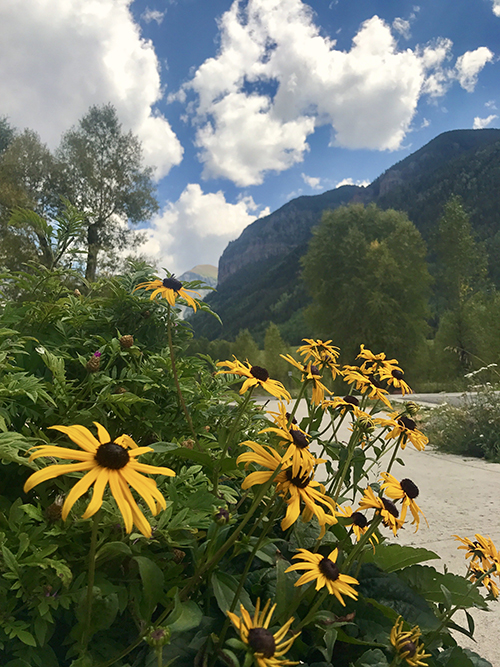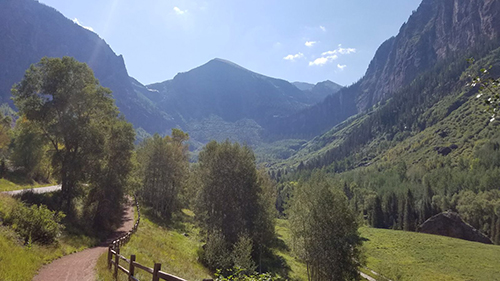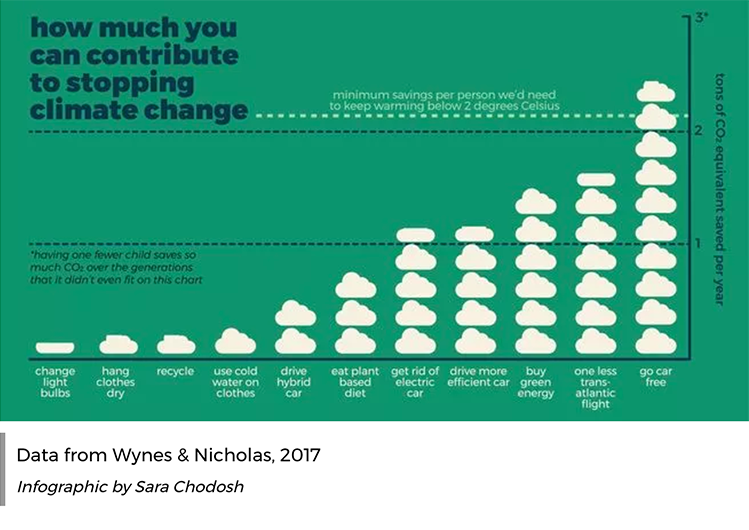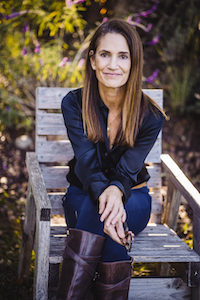Last week I flew (yes, flew, which matters in the context of this blog) to Telluride, Colorado for the 45th Annual Telluride Film Festival. The box canyon sheltering this town and its eponymous festival could not be more picturesque. Historic homes are nestled along the main street, tucked below massive rock formations, towering peaks of red and grey stone, adorned in shades of shimmering yellow aspen and deep blue-green spruce and fir. The San Miguel river winds its way through wildflower meadows, all beneath the brilliant “Colorado blue” sky. Just being there, feeling so small amongst the natural majestic beauty, brings on a euphoria. It is the same feeling many of us get as we explore the open landscapes and seashore of Marin County: an overwhelming sense of love for our planet.
 It made perfect sense that so many of this years’ featured films concerned themselves with climate change. How could we not concern ourselves with climate change? It is no longer a “cause,” but rather has become a reality that we must cope with. Whether it is our parents in Houston who are wondering how they will rebuild, our best friend in Missoula who can’t take her children outside due to smoke, or our grandmother who had to be evacuated from Southern Florida, at this point the consequences have descended upon us. Here in Marin we lay around dazed, last week, stupefied by the record-breaking heat wave, wondering if this could really be happening.
It made perfect sense that so many of this years’ featured films concerned themselves with climate change. How could we not concern ourselves with climate change? It is no longer a “cause,” but rather has become a reality that we must cope with. Whether it is our parents in Houston who are wondering how they will rebuild, our best friend in Missoula who can’t take her children outside due to smoke, or our grandmother who had to be evacuated from Southern Florida, at this point the consequences have descended upon us. Here in Marin we lay around dazed, last week, stupefied by the record-breaking heat wave, wondering if this could really be happening.
It is happening. It is happening fast. Faster and faster, in fact, which is the point of the very last film I saw at the Telluride Festival. Our country’s premier climate change crusader Al Gore presented the documentary An Inconvenient Sequel (made by Bay Area filmmakers Jon Shenk and Bonni Cohen and distributed by Marin’s own Roco Films). Before the film screened Gore spoke of the largest regional fire ever raging in LA, the thousand dead and 41 million displaced due to floods in Southern Asia last week, and of course, the tragedy in Houston. He pleaded, as he has done for decades, for each and every one of us to join him, to recognize the urgency of our collective situation and to bypass our president who pulled the United States out of the Paris climate accord in June. An Inconvenient Sequel ends with a title that says: IF PRESIDENT TRUMP REFUSES TO TAKE THE LEAD THE AMERICAN PEOPLE WILL.
Yes, we will. I know we will. We have to.
I have been asking myself some hard questions since I returned to Marin. What does fighting climate change look like here in Marin County? How do we, the citizens of one of the wealthiest counties in the U.S. go about making the most impact? We are a nature-oriented group, with a historical environmental legacy evidenced in the against-all-odds preservation of our open spaces from Pt. Reyes National Seashore to the Marin Headlands. We began recycling and embraced local and organic, veganism and vegetarianism, well before any of these choices went mainstream. We are educated and we care.
 However, what I began to realize as I watched An Inconvenient Sequel is that now is the time to do more. We in Marin County who have been in a position to take the lead, can do more (can you tell I’m talking to myself here?). We can and should give more to organizations such as Environmental Defense Fund, The Nature Conservancy, The Natural Resources Defense Council and The Energy Foundation that are on the frontlines in fighting Climate Change. Our support of these organizations and subsequent impact should definitely be proportional to our wealth. And, we should continue to make consumer choices based first and foremost on environmental impact, starting with our home (what kind of lightbulbs, what type of appliances do we use) to our food (how far did it travel, how much water did it take to grow) to our clothing (how far did it travel? how were the materials made?) to our cars (how much fossil fuel does it use, if it is electric, how is that electricity produced). There are so many small ways to improve our carbon footprint, and many of us are already doing all of the above.
However, what I began to realize as I watched An Inconvenient Sequel is that now is the time to do more. We in Marin County who have been in a position to take the lead, can do more (can you tell I’m talking to myself here?). We can and should give more to organizations such as Environmental Defense Fund, The Nature Conservancy, The Natural Resources Defense Council and The Energy Foundation that are on the frontlines in fighting Climate Change. Our support of these organizations and subsequent impact should definitely be proportional to our wealth. And, we should continue to make consumer choices based first and foremost on environmental impact, starting with our home (what kind of lightbulbs, what type of appliances do we use) to our food (how far did it travel, how much water did it take to grow) to our clothing (how far did it travel? how were the materials made?) to our cars (how much fossil fuel does it use, if it is electric, how is that electricity produced). There are so many small ways to improve our carbon footprint, and many of us are already doing all of the above.
But what I am getting at here, and what has been eating at me since absorbing the critical nature of our global circumstances, the big picture portrayed in An Inconvenient Sequel, is that we are not doing enough (again, can you tell I’m talking to myself?)
 In a recent opinion piece in the Toronto Star, Matthew J. Hoffmann, professor of political science at the University of Toronto and co-director of the Munk School’s Environmental Governance Lab writes, “Climate action needs to be front of mind and we have to normalize it not just in our big political decisions, economic planning, and in everyday life.” So, what does that mean in the context of “everyday life” in Marin County? What would it take to make our lives even more green, for us to normalize a truly climate-friendly lifestyle and veritably lead the way in fighting climate change?
In a recent opinion piece in the Toronto Star, Matthew J. Hoffmann, professor of political science at the University of Toronto and co-director of the Munk School’s Environmental Governance Lab writes, “Climate action needs to be front of mind and we have to normalize it not just in our big political decisions, economic planning, and in everyday life.” So, what does that mean in the context of “everyday life” in Marin County? What would it take to make our lives even more green, for us to normalize a truly climate-friendly lifestyle and veritably lead the way in fighting climate change?
Here’s the reality: It means more than just driving a hybrid car; it means giving up a car. And it means more than just buying our produce from West Marin; it means making West Marin (or Sonoma, or Mendocino) not just our source of food, but also our favorite vacation destination, eschewing flying to far off exotic places with our families and embracing the staycation. In other words, it means giving up flying for fun.
According to a new study out of Sweden’s Lund University cited in Popular Science magazine in on July 12, 2017, “going car-free” and “one less Trans-Atlantic flight” are the top two action items individuals can take (see graph). According to the study, just one less Trans-Atlantic flight is more than twice as effective as eating a plant-based diet.
I could go vegan, drive a hybrid car, and change out all of my lightbulbs and it would still be more impactful to skip just one trip abroad.
Wow.
Those two behaviors – going without a car (relying on bike, carpool, public transportation) and not using airplanes for fun – are radical notions here in Marin County, difficult pills for most of us to swallow. But they are exactly the “more” we are looking for, the most significant change we could make to improve our impact in the fight against climate change (yep, still talking to myself).
But here’s the catch, the reality I was considering even as I watched Al Gore’s new movie in beautiful Telluride: these changes are both, for lack of a better description, inconvenient.
Photos by Kirsten Jones Neff

Kirsten Jones Neff is a journalist who writes about all things North Bay, with special attention to the environment and the region’s farmers, winemakers and food artisans. She also works and teaches in school gardens. Kirsten’s poetry collection, When The House Is Quiet, was nominated for the Northern California Book Award, and three of her poems received a Pushcart nomination. She lives in Novato with her husband and three children and tries to spend as much time as possible on our local mountains, beaches and waterways. For more on her work visit KirstenJonesNeff.Com.


